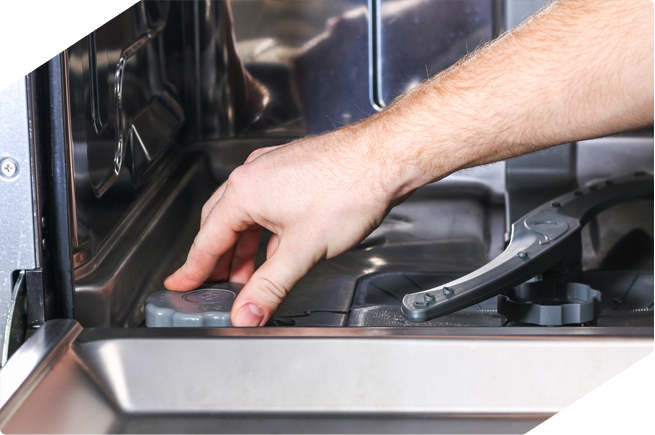The Importance of Dishwasher Salt for Optimal Cleaning
Using dishwasher salt helps to soften hard water, preventing limescale buildup and ensuring your dishes come out spotless. Learn how often to add salt and why it’s essential for your machine.


Using dishwasher salt helps to soften hard water, preventing limescale buildup and ensuring your dishes come out spotless. Learn how often to add salt and why it’s essential for your machine.



Written by Olivia Carter
Contributing Writer
Updated February 03, 2024
ishwasher salt is essential for maintaining the efficiency of your dishwasher, especially if you live in an area with hard water. Many people may not know that the buildup of calcium and magnesium from hard water can significantly reduce the performance of your appliance, leading to cloudy glasses and poor cleaning results. At Major at Appliance Repair, we want to help you keep your dishwasher in top condition, and using salt correctly is key.
Dishwasher salt is a special type of coarse salt designed to work with the dishwasher’s water softener unit. Its purpose is to regenerate the resin in your dishwasher’s water softening system, removing hard water minerals that can damage your machine and cause limescale buildup.
1. Improved Cleaning Efficiency: Hard water can leave spots, residue, and streaks on dishes and glassware. Dishwasher salt softens the water, allowing detergent to dissolve better and clean more effectively.
2. Prevents Limescale Build-up: Over time, hard water deposits can clog up your dishwasher’s mechanisms. Salt helps prevent limescale from forming, ensuring that your machine operates smoothly for a longer time.
3. Longer Dishwasher Life: By preventing the buildup of minerals, using salt regularly can help extend the life of your appliance by keeping its components clean and functional.
1. Locate the Salt Reservoir: Usually, the salt compartment is found at the bottom of your dishwasher. You might have to remove the bottom rack to access it.
2. Add the Salt: Using a funnel, fill the reservoir with dishwasher salt until it reaches the top. Do not use regular table salt as it can damage your machine.
3. Top Off Regularly: The salt reservoir should be refilled when the dishwasher’s salt indicator light comes on, or roughly every month, depending on usage.
• Always check your dishwasher’s manual for specific salt requirements.
• For those with soft water, the salt function may be unnecessary, but it’s essential for areas with hard water.
• Only use dishwasher-specific salt—never substitute it with household salt, which can clog the water softener and reduce efficiency.
By following these tips, you’ll ensure your dishwasher continues to perform at its best, saving you from repairs and improving cleaning results.
For more information or to schedule a service, contact Major at Appliance Repair, where we specialize in keeping your home appliances running efficiently!
Why is salt necessary in a dishwasher?
Dishwasher salt helps soften hard water, preventing limescale buildup on dishes and in the dishwasher. This ensures optimal performance and spotless dishes.
How often should I add salt to my dishwasher?
How often depends on your water hardness and dishwasher usage. Most dishwashers have an indicator light that will notify you when it’s time to refill the salt compartment.
Can I use regular table salt in my dishwasher?
No, you should only use dishwasher-specific salt. Regular table salt contains additives that can damage the appliance and cause residue buildup.
Feel free to ask our specialist any questions you may have.
Call (415) 406-2656
Or call (415) 406-2656
From average costs to expert advice, get all the answers you need to get your job done.
Our specialist will contact you at the exact time specified in your request.
If necessary, you can call us at (917) 373–3113 between 7:00 am – 7:00 pm everyday.